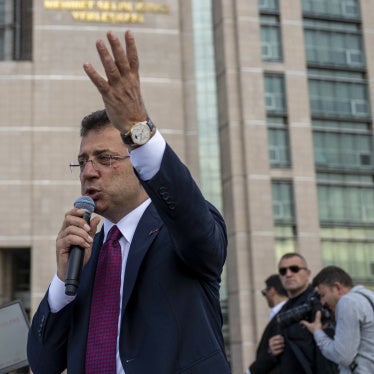Republika Srpska authorities should refrain from verbal attacks on Transparency International Bosnia and Herzegovina and ensure the security of the organization’s staff and premises, Human Rights Watch said today.
The anti-corruption group decided to suspend its operations in the Bosnian Serb republic on July 10, 2008, citing security concerns for its staff. The decision follows a campaign of intimidation by the Republika Srpska authorities, including the entity’s prime minister, Milorad Dodik accusing the group of racketeering and extortion on July 1. He also called on Republika Srpska citizens to come forward with evidence of the organization’s alleged unlawful activities, offering them “full witness protection.”
“The campaign against Transparency International needs to stop,” said Wanda Troszczynska-van Genderen, Western Balkans researcher at Human Rights Watch. “If there is any evidence of wrongdoing by Transparency International’s staff, it should be investigated. In the meantime, the Republika Srpska authorities should provide the security and space to allow the organization to resume its important work.”
Transparency International has been a vocal critic of privatization activities in Republika Srpska and has criticized its authorities for a lack of transparency and alleged procedural irregularities in the privatization process. The Republika Srpska authorities, and in particular Prime Minister Dodik, have responded with escalating criticism of Transparency International’s work.
The international Office of the High Representative (OHR) in Bosnia has described the allegations against Transparency International as a “propaganda campaign.” On July 9, the OHR presented a letter from Dragomir Babic, a Republika Srpska activist, describing how the harassment campaign had already been planned in February 2008, to the acting chief prosecutor of Bosnia.
Babic, who had originally sent the letter anonymously to the OHR in February, went public after Transparency International’s Banja Luka office temporarily closed its office on July 10, 2008. (The operations have not yet fully resumed at the time of this writing.) Since then, Babic has been receiving anonymous death threats.
The pressure on Transparency International in Bosnia has also been criticized by the European Parliament’s rapporteur on Bosnia, Doris Pack. Bosnia signed a stabilization and association agreement with the European Union on June 16, the first step toward eventual membership. Respect for the rule of law and civil society are among the criteria for accession.
“If Bosnia is serious about closer ties to the EU, it needs to ensure that civil society can do its work without political inference,” said Troszczynska-van Genderen. “Those who investigate allegations of corruption need particular protection.”
The risks for those who confront corruption in Bosnia were underscored in November 2007, when Milan Vukelic, an employee of the Banja Luka Town Planning Institute, was killed by a car bomb. Vukelic had reported alleged corruption in his organization. To date, the investigation carried out by the Republika Srpska authorities has failed to identify a perpetrator.







